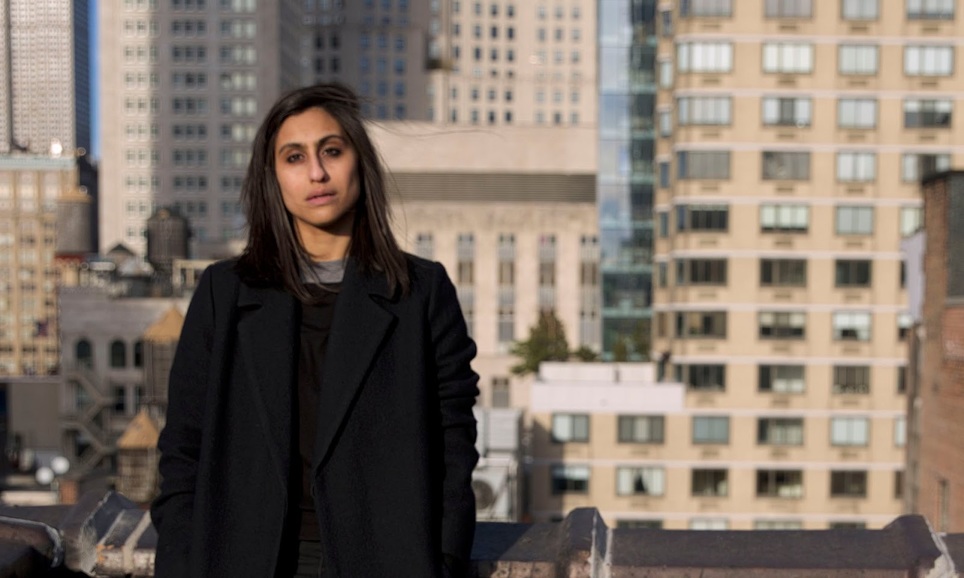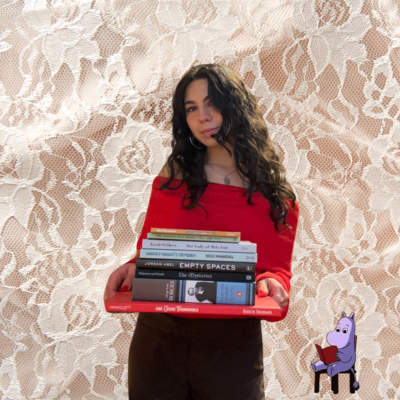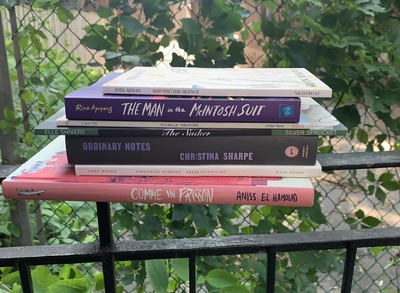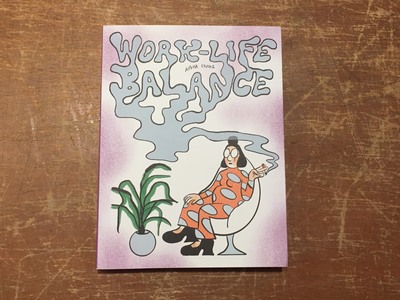This shelf belongs to...Durga Chew-Bose!
June 4, 2017

| Photo: Carrie Cheek |
Durga Chew-Bose’s writing frequently appears on websites such as Hazlitt, The Hairpin, BuzzFeed, Grantland and Papermag. She has contributed articles to The Guardian and The Globe and Mail, and to the magazines GQ, Interview, n+1 and Adult. Born in Montreal, Chew-Bose now lives in Brooklyn, New York.
Smith kicks off this collection of non-fiction by stating, "This book was written without my knowledge." It's as if the collection is a piling up, all at once intentional and unintentional. The book's subtitle, "occasional essays," captures how there's something random and intermittent about the topics which range from witty asides about Oscar weekend, to impassioned audits of literature and novel writing, to beautiful essays about family and identity and personhood.
Robert Bresson - Notes on the Cinematograph
Pocket-sized, Bresson's memos on craft and technique read like poetry, philosophy, or if I'm feeling especially precious, fortunes. It's a log of Bresson's approach to filmmaking, like a near-monastic instruction manual that deeply influenced Too Much and Not the Mood. "Don't show all the sides of things," he writes. "A margin of indefiniteness." There are also plenty of vague, elegiac nuggets like, "Debussy himself used to play with the piano's lid down." Reading Notes feels holy. One one page he'll jump from statements like, "Neither beautify nor uglify. Do not denature" to "Your film is beginning when your secret wishes pass into your models." One of my favorites and something I try and remind myself of whenever I get caught up trying to crystalize an idea: "Prefer what intuition whispers in your ear to what you have done and redone ten times in your head."
Virginia Woolf - The Waves
The Waves is strange, lovely, lyrical. Totally experimental. Immersive. Woolf called it her "play-poem." Six lives intertwined, told unconventionally. The first time I read it, I found the experience very taxing but ultimately, it moved me to want to make something. Some parts feel like a catalog of life's little pleasures. Most of the time though, it reads like Woolf longing for stillness or stillness as the only way to capture longing. You'll be tempted to underline the whole book.
Marguerite Duras - The Lover
There is so much to love about The Lover but one passage in particular sort of cracked open the world for me, cracked open writing for me: "Sometimes, I realize that if writing isn't all things, all contraries confounded, a quest for vanity and void, it's nothing." I'm so drawn to Duras' attitude, to her capacity for nostalgia's hold on us. She writes about memory as though memory is...women.
Anne Carson - Glass, Irony, and God
One of my favorite sentiments expressed perfectly by Carson in these four lines:
You remember too much/
my mother said to me recently/
Why hold onto all that? And I said, Where can I put it down?
Adrian Tomine - Killing and Dying
This book is gorgeous. I wish it was longer. Tomine is a master of creating worlds that feel familiar but only in an emotional déjà vu type of way. He's so good at spooky recognition. If you've ever loved someone who is grumpy-gentle or sad-happy-mostly-sad, this book will resonate with you. My favorites in this graphic short story collection are "Translated, from the Japanese" and "Amber Sweet."
Jamaica Kincaid - Talk Stories
There's never been and will never be anyone else like Jamaica Kincaid. This collection from her work in the New Yorker's The Talk of the Town section is all voice, attitude. It's deliberate and cheeky, and matter-of-fact brilliant.
Frank O'Hara - The Collected Works of Frank O'Hara
Frank O'Hara forever. If you're in love or missing an old love, or if you're seeking meaning, or if you're hoping to counteract the day's crazy, or if New York is on your mind, or you'd like to quickly conjure New York -- its sounds, its lovely strangers, the Frick -- but especially if you're feeling prone to the world, to its big and to its small, then you'll want to crack open O'Hara's poetry. He strings together what might seem unlikely and poof! you'll feel like oof! His work feels like having at your disposal, everyday wisdom from your most open-hearted pal. Like this poem, "Today":
Oh! Kangaroos, sequins, chocolate sodas!
You really are beautiful! Pearls,
harmonicas, jujubes, aspirins! All
the stuff they've always talked about
still makes a poem a surprise!
These things are with us every day
even on beacheads and biers. They
do have meaning. They're as strong as rocks.
Charles Dickens - Great Expectations
A classic. Some days I feel like Pip. Other days: Estella. Even or maybe most often, weirdly like Miss Havisham.
Hilton Als - White Girls
The book's opening piece, "Tristes Tropiques," is a work of art that I return to often.
Rivka Galchen - Little Labors
Rivka Galchen's plainspoken prose about babies and mothers is so much more than a book about new motherhood. Inspired by Sei Shonagon's Pillow Book, Little Labors is Galchen's everyday appraisal--part diary, part prosaic olio--of how her life has been altered, "re-enchanted" she notes, since having "the puma." Galchen positions the baby as a mystery, as myth, as "nothing," as a series of interruptions, as a meaning-benefactor, as something to inspire tangents, as something that has made her world suddenly "ludicrously, suspiciously, adverbially sodden with meaning." Some anecdotes end before they even start while others propose theories about, for instance, why the color orange is so popular, on baby things, baby clothes, baby toys and furniture. Speaking of orange: the cover! It's so beautiful, simple, bright.
Leanne Shapton - Was She Pretty?
Shapton's gem-like exploration of jealousy makes for a deeply uneasy albeit addictive book that feels like having a mirror held up to you for brief, near-paranoid bouts of panic. Maybe that isn't the best way to recommend this book. I, personally, find reading about jealousy extremely invigorating. Tip: flip it open to whatever page while listening to Michael Jackson's "Who Is It." The two pair very well.
James Baldwin - The Devil Finds Work
This book length essay is one of my favorite, most influential pieces of film criticism. Here's a sampling, from Baldwin's consideration of The Exorcist: "For, I have seen the devil, by day and by night, and have seen him in you and in me: in the eyes of the cop and the sheriff and the deputy, the landlord, the housewife, the football player: in the eyes of some junkies, the yes of some preachers, the eyes of the some governors, presidents, wardens, in the eyes of some orphans, and in the eyes of my father, and in my mirror. It is that moment when no other human being is real for you, nor are you real for yourself. This devil has no need for dogma -- though he can use them all -- nor does he need any historical justification, history being so largely his invention. He does not levitate beds, or fool around with little girls: we do."
There's never been and will never be anyone else like Jamaica Kincaid. This collection from her work in the New Yorker's The Talk of the Town section is all voice, attitude. It's deliberate and cheeky, and matter-of-fact brilliant.
Frank O'Hara - The Collected Works of Frank O'Hara
Frank O'Hara forever. If you're in love or missing an old love, or if you're seeking meaning, or if you're hoping to counteract the day's crazy, or if New York is on your mind, or you'd like to quickly conjure New York -- its sounds, its lovely strangers, the Frick -- but especially if you're feeling prone to the world, to its big and to its small, then you'll want to crack open O'Hara's poetry. He strings together what might seem unlikely and poof! you'll feel like oof! His work feels like having at your disposal, everyday wisdom from your most open-hearted pal. Like this poem, "Today":
Oh! Kangaroos, sequins, chocolate sodas!
You really are beautiful! Pearls,
harmonicas, jujubes, aspirins! All
the stuff they've always talked about
still makes a poem a surprise!
These things are with us every day
even on beacheads and biers. They
do have meaning. They're as strong as rocks.
Charles Dickens - Great Expectations
A classic. Some days I feel like Pip. Other days: Estella. Even or maybe most often, weirdly like Miss Havisham.
Hilton Als - White Girls
The book's opening piece, "Tristes Tropiques," is a work of art that I return to often.
Rivka Galchen - Little Labors
Rivka Galchen's plainspoken prose about babies and mothers is so much more than a book about new motherhood. Inspired by Sei Shonagon's Pillow Book, Little Labors is Galchen's everyday appraisal--part diary, part prosaic olio--of how her life has been altered, "re-enchanted" she notes, since having "the puma." Galchen positions the baby as a mystery, as myth, as "nothing," as a series of interruptions, as a meaning-benefactor, as something to inspire tangents, as something that has made her world suddenly "ludicrously, suspiciously, adverbially sodden with meaning." Some anecdotes end before they even start while others propose theories about, for instance, why the color orange is so popular, on baby things, baby clothes, baby toys and furniture. Speaking of orange: the cover! It's so beautiful, simple, bright.
Leanne Shapton - Was She Pretty?
Shapton's gem-like exploration of jealousy makes for a deeply uneasy albeit addictive book that feels like having a mirror held up to you for brief, near-paranoid bouts of panic. Maybe that isn't the best way to recommend this book. I, personally, find reading about jealousy extremely invigorating. Tip: flip it open to whatever page while listening to Michael Jackson's "Who Is It." The two pair very well.
James Baldwin - The Devil Finds Work
This book length essay is one of my favorite, most influential pieces of film criticism. Here's a sampling, from Baldwin's consideration of The Exorcist: "For, I have seen the devil, by day and by night, and have seen him in you and in me: in the eyes of the cop and the sheriff and the deputy, the landlord, the housewife, the football player: in the eyes of some junkies, the yes of some preachers, the eyes of the some governors, presidents, wardens, in the eyes of some orphans, and in the eyes of my father, and in my mirror. It is that moment when no other human being is real for you, nor are you real for yourself. This devil has no need for dogma -- though he can use them all -- nor does he need any historical justification, history being so largely his invention. He does not levitate beds, or fool around with little girls: we do."


